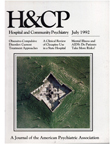Therapeutic Benefits of Interest-Based Mediation
Abstract
It is commonly assumed that parties in mediation must be "rational." This case presents evidence that high-functioning psychotic patients can successfully use mediation during lucid periods when sufficient support is available. Patients' new insights about how their behavior affects others suggest that interest-based mediation may have therapeutic value, in addition to its efficacy in resolving conflicts. The case raises questions, which remain to be explored, about the generalization of successful outcomes to other situations.
Access content
To read the fulltext, please use one of the options below to sign in or purchase access.- Personal login
- Institutional Login
- Sign in via OpenAthens
- Register for access
-
Please login/register if you wish to pair your device and check access availability.
Not a subscriber?
PsychiatryOnline subscription options offer access to the DSM-5 library, books, journals, CME, and patient resources. This all-in-one virtual library provides psychiatrists and mental health professionals with key resources for diagnosis, treatment, research, and professional development.
Need more help? PsychiatryOnline Customer Service may be reached by emailing [email protected] or by calling 800-368-5777 (in the U.S.) or 703-907-7322 (outside the U.S.).



